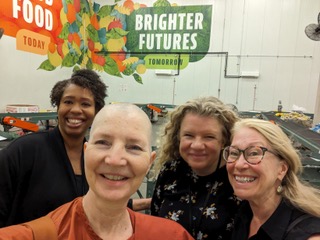By Ayyā Dhammadīpā and Patricia A. Price
In August 2023, BGR Board member Ayyā Dhammadīpā and Deputy Director Patti Price visited new BGR program partner the Capital Area Food Bank (CAFB). Based in northeast Washington, D.C., CAFB was founded in 1980 and presently has 350 partners across the region, in the city as well as in southern Maryland and northern Virginia. They operate 315 direct distribution sites at schools, community centers, and churches, among other locations.

Over the course of two hours, we toured the massive facility, where groups of volunteers (school age through older adults) helped to pack boxes of food destined for community-based distribution sites and the homes of seniors and disabled people. We also visited their onsite garden and met the full-time garden manager, whose staff consists entirely of volunteers. Last year, the garden provided 45 percent of CAFB’s fruit and vegetables; this year, they’re aiming to increase that number, to grow 50 percent of the programs’ produce. CAFB’s overall focus is on nutrition, with at least 70 percent of distributed food qualifying as “wellness food”—that is, food high in fiber, but low in salt and sugar.
In the 2023–2024 project year, BGR is helping to fund two programs with the Capital Area Food Bank:
(1) A food and health project with the Children’s National Hospital.
The food bank established an on-site food pharmacy at the National Children’s Hospital in Washington to meet the needs of food-insecure diabetic children and their families. The majority of children with Type 2 diabetes live in two poor D.C. wards where 80 percent of the city’s “food desert” neighborhoods are located. During children’s stay at the hospital, families receive nutrition training in a new Diabetes Ward kitchen. Upon discharge and after follow-up visits, the children’s families receive a 35–40 pound food box containing fresh produce, whole grains, lean proteins, reduced fat dairy, canned fruits, vegetables, and a nutrition toolkit with recipe cards.
This year, CAFB and the Children’s Hospital are launching a three-year study to measure medical outcomes in children with Type 2 diabetes. Two hundred families will be identified for the project, each receiving weekly food deliveries for twelve months followed by a six-month follow-up to assess durability of impact. BGR’s grant will help fund the healthy groceries for this project.
2) Addressing child food insecurity.
As 60 percent of children in the region qualify for free or reduced meals, schools are a daily source of proper nutrition. However, because these children remain food insecure in the summer, a BGR grant supported summer meals at one of 74 playgrounds in D.C.
We are glad to support this new partner in providing critical nutrition-focused programs to improve the health of ill and underserved children in the greater D.C. region.
Ayyā Dhammadīpā is a BGR Board member and the founder of the Dassanāya Buddhist Community in Alexandria, Virginia. She is a fully ordained bhikkhuni in the Theravāda tradition and a Dharma Heir in Soto Zen. In addition to English, Ayyā teaches in Spanish, an expression of her Latin heritage.
Patricia A. Price is the deputy director of BGR. Contact her at pricep@buddhistglobalrelief.org.
